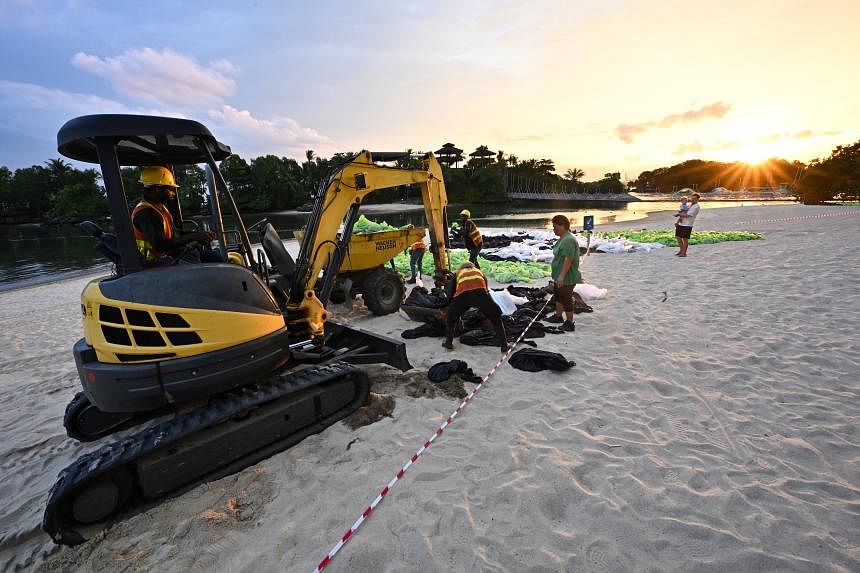SINGAPORE – Volunteers may be tapped in the final phase of beach cleanup operations to remove tar balls, which are small blobs of coagulated oil mixed in sand, said Minister for Sustainability and the Environment Grace Fu.
“This will likely be done with rakes and sieves, rather than shovels, to avoid removing too much uncontaminated sand,” said Ms Fu on June 24.
“We are planning to involve volunteers working alongside our cleaning personnel so that we can relieve our workers and accelerate the reopening of our beaches. We will ensure that this is conducted safely and that volunteers are properly equipped,” she added.
She was giving an overview of the progress of cleanup operations following Singapore’s largest oil spill in more than a decade during a joint ministerial press conference.
About 400 tonnes of oil spilled into Singapore waters after Netherlands-flagged dredging boat Vox Maxima hit the stationary Singapore-flagged bunker vessel Marine Honour at Pasir Panjang Terminal on June 14.
Ms Fu said the initial phase of cleaning has been largely completed. Large patches of oil and 550 tonnes of oil-soaked sand have been removed from the sea and affected beaches.
Oil-soaked sand is sent to licensed toxic industrial waste collectors for treatment. Heat is used to vaporise oil and water from contaminated sand. The recovered oil can be converted into a product for resale, while the sand can potentially be repurposed for industrial uses.
Sand is not incinerated at Singapore’s waste-to-energy plants together with municipal solid waste.
The next phase of cleanup involves specialised cleaning regimes to get rid of oil remnants in hard-to-access places such as rock bunds and breakwaters.
“Once these are done, we will enter a final phase of cleaning where we comb the beach and remove tar balls – small blobs of coagulated oil – in the sand,” Ms Fu said, adding that the Government plans to involve volunteers in that process.
She thanked those who have offered their time and effort to assist in cleanup efforts, but pointed out that so far, volunteers have not been directly involved in actual cleanup actions due to the complexity of the task and for their personal safety.
More than 1,500 volunteers have signed up to help with oil spill management efforts, and more than 2,000 others have registered to be kept closely updated on ongoing efforts and future volunteering opportunities.
So far about 400 volunteers, including those from the Public Hygiene Council, have been deployed.
They helped to patrol East Coast Park and West Coast Park and advised members of the public to stay away from affected beachfronts, and reported sightings of oil stains and of oil-slicked wildlife.
The Friends of Marine Park community – a voluntary network that includes marine scientists, boat users and ocean-dependent business owners – will partner the Government on habitat surveys at intertidal areas such as along East Coast Park and Changi Beach Park.

